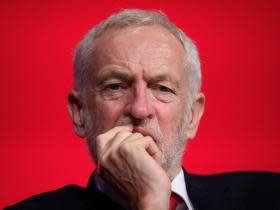Brexit: Corbyn calls for 'no-confidence' motion in May – but not under procedure that could lead to an election
Jeremy Corbyn has called for a vote of no confidence in Theresa May, but backed away from the official mechanism that could actually trigger an election to oust her.
The Labour leader said he was tabling the motion because Ms May had refused to allow parliament a vote on approving her proposed Brexit deal which was supposed be to held earlier this month.
However, the government says it will not allow parliamentary time for a vote on the motion, a Downing Street source said. “We won’t allow time for what is a stunt. The FTPA (Fixed Term Parliament Act) applies if Labour wants to put down a motion under the terms of that.”
Mr Corbyn was immediately accused of “bottling” it by other opposition parties who are instead calling for him to back a move under the official motion of no-confidence procedure as set out in law, something the Labour leader has so far refused to do.
Read more
Labour top team split on when to table no-confidence motion in May
It came as Ms May appeared in the Commons to deliver a statement on the European Council meeting last week which ended with her still needing to win further concessions from the EU in order to make her deal viable.
On Monday afternoon Labour revealed that Mr Corbyn would call for a “vote of no confidence” in the prime minister if she failed to set a date for the vote on her Brexit proposals.
As it was Ms May did confirm a date – sometime during the week beginning 14 January – but Mr Corbyn still went ahead and called for his motion.
He said: “A responsible prime minister would, for the good of this country, put this deal before the house this week so we could move on from this government’s disastrous negotiation.”
Labour confirmed however, that the move would not come under the auspices of the Fixed Term Parliament Act, which would potentially require election if the government loses the vote.
However, even if the government did allocate time for it the result would not be binding on Ms May or the government in terms of resignation or an election.
If Ms May did lose the vote it might still be severely destabilising if lots of Tories refused to support her, something which might have been a prospect given that only last week 117 opposed her in an internal Tory party confidence vote.
But after Mr Corbyn made his call in the Commons, the European Research Group of backbench Tories, which has led internal opposition to Ms May, said it would back the government if the Labour motion ever came to the house.
Commenting on the motion, Liberal Democrat Leader Vince Cable said: “Corbyn knows that for a no-confidence motion to matter it should relate to the Conservative government as a whole. That is the way to precipitate the general election he says he wants.
“Instead he turns his fire not on the Tories or Brexit but Theresa May personally, ducking the real issue and bottling the real vote the Commons needs.”
SNP Leader Nicola Sturgeon said on Twitter: “Labour tabling a motion just in the PM rather than in the entire government begs the question, which Tory do they want to see as PM?”

